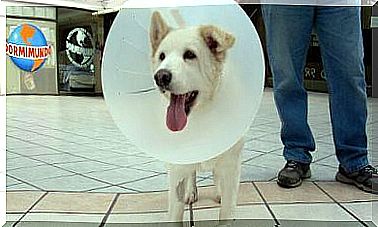Transmissible Venereal Tumor, The Contagious Tumor Of Dogs

Few people know that there are cancers that can be transmitted. Certainly a serious situation that can scare any owner. We are talking about the transmissible venereal tumor, a disease that can be infected by most canines. Also known as Sticker’s sarcoma, transmissible venereal cancer affects dogs but also some species of fox and coyote.
Cancer that can be passed on from dogs
We are talking about the oldest type of tumor known in dogs and which has the particularity, in fact, of being able to be transmitted to other specimens. This is not the only disease of its kind, however. Species such as Syrian hamsters and clams can develop other equally contagious types of cancer.
Infection in the animal’s body can be very powerful. In these cases, the disease evolves with the aim of surviving beyond the first organism it affects, introducing itself to another host.

How do these malignant tumors spread?
Transmissible venereal cancer usually spreads during mating or when a dog sniffs or licks any of the mucous membranes in the affected dog. It is for this reason that this type of cancer usually develops in the genital area, although it can also affect other areas, such as the nose.
The interesting thing about these contagious tumors is that they have a completely different and unique behavior, compared to those that affect other living beings. These cancers have evolved to migrate and find new tissues that allow them to continue to develop.
Due to these peculiarities of the tumor, dogs become infected when they come into contact with the other dog’s cancer cells. That is, the presence of a virus or other form of contagion is not necessary. In this way, the cancer cells pass from one animal to another and are able to last much longer.
The “zero” patient
Several investigations have concluded that this type of tumor retains a different DNA from that of the host.
Most cancers form when affected cells mutate uncontrollably. Due to this process, tumors “copy” the DNA of the affected individual. Conversely, this is not the case with transmissible venereal cancer.
Researchers estimate that this type of cancer started developing around 11,000 years ago. He has evolved and adapted, so his aggression level is very high indeed.
It is a tumor that responds very well to treatments, so it is unlikely to metastasize in the body. However, there is always this possibility
If we compare it to other types of cancer, TVT is considered one of the least aggressive.

Is it possible to prevent the transmission of TVT?
If you have a dog, it is logical that you learn to take preventive measures to avoid exposing the animal to the contagion of this tumor (but also of other diseases). One of the most logical recommendations concerns sterilization.
The ideal age to make it is around 12 months. In the case of a large breed dog, it is good to wait until 18.
The reason why sterilization is so important lies in the fact that the spread of this tumor occurs with the act of reproduction. Without reproductive organs, the chance of your dog being infected is reduced.
Likewise, we recommend that you keep dogs in a clean environment. Then, don’t neglect periodic visits to the vet, especially if you notice any major changes. It is not always easy to identify the symptoms of a tumor, especially if it acts internally.
In the case of TVT, a bloody red spot usually appears. The habit of maintaining good hygiene, both of the house and of the animal itself, are two key aspects to avoid the possible transmission of the tumor.
Conclusions on transmissible venereal tumor
As you have seen, there are cancers that can be transmitted. While it is quite rare, it is fair to be aware of the possibility of coming across a case of transmissible venereal cancer. A virus that has managed to colonize another organism, behaving like a parasite.
Always keep your dog under control, sterilize him and avoid contact with other specimens you do not know. Even if this disease can be cured, it is always advisable to keep the attention high and ensure all preventive medicine measures.









